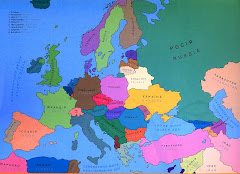
I learned about the Eastern Ukraine Center for Civil Initiatives, a management, training and policy NPO funded by USAid, the National Endowment for Democracy, and other funders, through Vera Flyat, the director of Victoria NGO and my counterpart in Starobilsk (below problem solving in a small group session and presenting with seminar leader). The Center's projects fall under the umbrella of "Total Action for the Support of H

uman Rights and Democracy." Vera has taken several of their organizational development and leadership seminars, held at the Shevchenko University in Lugansk. I've attended some of them with her, and they are outstanding.
The founding staff includes two smart young Ukrainians, Yuliya Rashchupkina and Volodymyr (Vovo) Shcherbachenko (photo top right),
who understand the global trajectory of Ukrainian life.Their organization does not engage in politics or polemics. Its mission is to strengthen the nonprofit (NPO), or non-governmental organization (NGO), sector in Ukraine and to promote informed citizen participation in local decision-making. It seeks to strengthen
the frame work for change
work for change by training grassroots leaders of the country who will, in turn, create the civil society and transparent democracy for which the people long.
Their varied projects address critical issues confronting Ukraine today: education in transparent procedures and processes for new urban construction and for land distribution (huge problems); the economic and social importance of preserving the nation's cultural and historical heritage; training local NGO staff and volunteers to expose and resist corruption in government, and how to access information; training farmers in the most impoverished rural regions of our Oblast for leadership roles in their communities.
This is, indeed, the 21st century Agenda for Social Change in Ukraine. Yuliya and Vovo are right on top of it.
The Eastern Ukraine Center for Civil Initiatives is just one of hundreds of such organizations throughout Ukraine. They don't make front page news, their work is often underground, but they are making a dramatic difference. Their work adds up to extraordinary efforts to develop and strengthen civil society and the nonprofit sector in this former Soviet republic. This is a relatively new development, maybe 10 years old, but it is planting seeds of change. The great news is that it is happening in eastern Lugansk (Luhansk in Ukrainian) oblast, where resources are often limited, poor rural communities predominate, the gap between rich and poor is large, and change is slow.
Vovo and Yuliya were college students when their civic activism began, Vovo at the Luhansk Shevchenko University and Yuliya at Eastern Ukraine National University. Vovo has also studied in the US, at the University of Kansas, an acclaimed higher education institution and an important milestone in his evolving philosphy of social change. In addition to his work with the Initiative, he is now working on a Masters degree in urban design and policy at a university in Sweden. He speaks English (he demurs, but his English is excellent), understands modern organizational practices, is extremely knowledgable about his country's history, and has a vision for a stronger Ukrainian society.
Yuliya shares this vision. She is also hoping to continue her education and do graduate work in the States. She joined the Human Rights movement in eastern Ukraine when the University administration pressured students to vote a certain way; she was also greatly influenced and inspired by the Orange Revolution and its hope for a democractic Ukraine. Yuliya is an articulate, talented and skillful professional.
Investing in young adults like Yuliya and Vova is the best hope for Ukraine's future. Contemporary in their thinking, politically savvy, hard working and committed, they don't wave banners and make speeches. They do the grinding day-to-day work of preparing for and conducting high-quality seminars and workshops, providing skilled trainers along with excellent and useful materials and information, increasing the knowledge and skills of future leaders. Vera has greatly benefitted from these seminars, a chance to learn, to network, to strengthen skills, and to grow as an NGO director and community leader. This is the wave of the future that gives reason for optimism.
Things are churning beneath the surface of "politics as usual" in Ukraine. Change is happening from the bottom up. These impressive efforts will one day bear fruit, ensuring the steady evolution of Ukraine into a modern, unique and thriving nation. It's already happening, one seminar at a time, thanks to young visionaries like Vovo and Yuliya.




















































